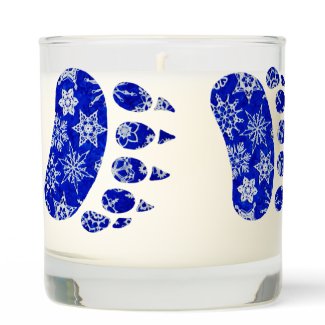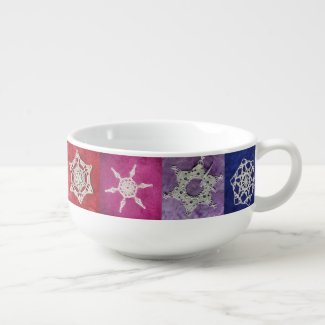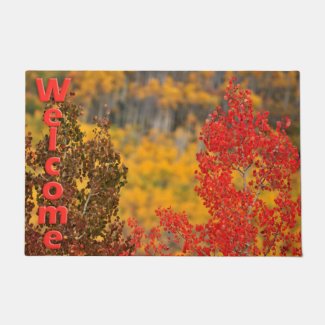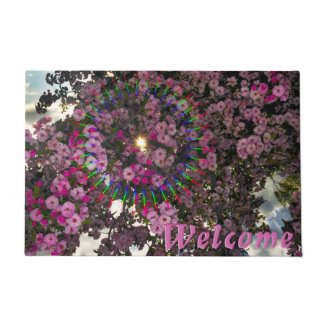28 February 2020
27 February 2020
Dressed to Thrill

Turning a $7 thrift shop dress into a "looks like $700 dress" was an interesting read in my news subscription email in 2015. The author used one thrift-shop find to convert another thrift-shop find that didn't fit into the right size by dismantling the first piece and inserting lace panels and hem into the second piece, creating a beautiful wearable piece of art for pennies on the dollar.
I absolutely love the concept, but I rarely shop for clothes anymore, with the exception of T-shirts and turtlenecks to wear beneath jumpers I make myself (although I did frequent thrift shops for clothing bargains back when my kids still lived at home).



My fashion addiction is one-of-a-kind clothing I make and often design myself. For the last decade or more, I've used remnants from my stash to piece my clothing.



This fun time bandit began back in high school the first time I was able to afford a piece of each fabric in a coordinated collection, way back before precuts. If I recall correctly, I think it took six babysitting jobs to pay for six yards of fabric! This was long before the current going rate for babysitting and the current cost of nice fabric. I think I made $2.50 a night for babysitting way back then, and I probably never spent more than 99 cents a yard for fabric then. I had other expenses that came before play (monthly PE towel and locker fee, notebooks, paper, pens, tissue, astringent for my oily face, etc.), so buying a vinyl record album ($4.99 back then) or a good pair of jeans ($8.99) would take about twice as much money raised before I could actually fun-spend.
The white cotton I bought featured pastel pin stripes, each yard in a different color. I cut the fabric into two-inch squares, some horizontal, some vertical and some diagonal, which I then restitched together into a huge piece of fabric I then cut into a collared button-up dress shirt I wore for many years, until the sleeves became so thin, my elbows poked through. I wish I had a picture of that blouse. It was my favorite for so long!



Now all my favorite pieced clothing is becoming too thin to wear any longer again, and I'm spending too much time patching. Even traditionally-sewn dresses are wearing thin because I wear them too long. And that's not a complaint at all, except I wish the fabric would last longer.






I think it's time for a new wardrobe. But you won't find me shopping in any mall. I'll be making my new dresses from what I have in my stash. I'll even be using patterns I've kept using over and over and over until they, too are becoming nearly too thin to use anymore!


Labels:
dress
,
fashion
,
fix
,
leftovers
,
pieced dress
,
quilting
,
repurpose
,
sewing
,
stash busting
26 February 2020
Wordless Wednesday
Labels:
macro photography
,
photography
,
snow
,
snowflakes
,
winter
,
wordless wednesday
25 February 2020
The Dark Side

AUTHOR'S NOTE: The following blog post was written in 2014. I didn't initially remember writing it (or creating the great motivational photos!!!), and I don't know why I didn't hit "publish" back then, but when I stumbled across it last weekend, the message was so powerful, I decided it's still very much worth sharing. I hope everyone who reads it will know they are not alone, and they are loved.
I recently had a very strange dream. I dreamed I was back at the turn of the century and my heart was broken all over again, but in my dream it happened in front of my kids, and I hid so they wouldn't see me cry. I cried for about two hours. I wrote poetry, and I ran mile after mile. The intense sadness and inability to find joy anywhere felt so real, just like it had felt in real life. Yet I kept trying to find something to smile about.
Two hours later in the dream, I was fine. When I realized I was fine, I got down on my knees and thanked God for helping me get over it so quickly, as if I knew in the dream it could have been far worse –- WAS far worse in real life. When I awoke, it didn't feel like a dream. It felt real.
I laughed into my pillow. Oh, if only real life could have been that easy!

As I cuddled in my quilt trying to make sense of the dream, I pondered the depression I've experienced this winter for no apparent reason. Very real, very incapacitating. I'm doing my best to not let it get the best of me.
What's different now? What makes me better able to fight depression I could not conquer 15 to 20 years ago? Am I doing something now I can share with others to help them survive sadness, too?
There is one huge, gigantic difference now. I mean, besides being married to my best friend, which I believe is another huge factor. When I worked in college and newspaper darkrooms, I literally was in the dark eight to ten hours a day. Seasonal affective disorder (SAD) did not have a name until 1984, and I don't think I knew about it until a good two decades later.
Daylight plays a huge role in my life now. I no longer work in a darkroom, and now I know about SAD. I understand how darkness affects me now, and I try to bask in daylight every chance I get. I have a daylight lamp in my office in an attempt to successfully wage combat during lengthy sun-stealing storms. (And annual fourth quarters when work stress and demands form a more fearsome army than any dark cloud.)

I also didn't know before about 2003, following the suicide of a very dear loved one, plus all the training leading up to my first Ride the Rockies, how big a role endorphins play in my own personal mood swings. Staying active not only helps me fight diabetes while keeping me creatively in tune, pedaling my way through a day supplies me with my daily required allowance of feel-good molecules.
Another big difference between now and age 20, when I should have been at the height of my youthful exuberance, to about age 42, when my world came crashing down in a series of tragic blows, is the continual back pain I endure now. Chronic pain can be one of the biggest triggers of depression, and I'll confess, there are days when it literally takes the best of me. My initial back injury happened two years after I worked my way through the deepest, darkest abyss and then was magnified by another injury two and a half years ago.
I have no doubt endless pain would have taken its toll had it occurred before I learned and developed tools to effectively fight depression. For the last 12 years, I've been on the upswing, even with injuries and pain.

The tools, undoubtedly, make the difference.
What are these tools? How do I stay happy now in the face of chemistry inside me I didn't ask for and can't always control?
Although I suffered depression as a teenager, I didn't really understand it or know it had a name for about six years. Those initial years, I was embarrassed by what I felt. Back then, it was common to judge anyone who needed a therapist as incompetent, selfish, immature, crazy and even stupid. Therapy wasn't available on every street corner, and there definitely wasn't money to pay for it, especially for those suffering secretly.
I believe having someone to talk to candidly about my feelings would have been a tremendous help.

Back then, I would write poetry. Sometimes it helped; sometimes it made it worse. One day, my high school locker was broken into, and my book of poetry (among other things) was stolen. Back then, I felt as though my whole world had ended. Not only was something precious to me gone, but someone might read it. I tiptoed through the next several years assuming everyone who looked at me "knew." That probably didn't help my depression at all.
Writing definitely was a good thing and something that shaped my future. Again, having someone I could confide in may have made a difference.
Back then, I also listened to a lot of sad ballads. I felt the singers could relate to what I felt. But this did not boost my morale at all and often made me feel worse in the long run.
When I began recognizing that sad music made me feel sad and happy music helped me walk with a bounce in my step, I did not totally give up heart-jerking lyrics, either listening to them or writing them, but I did try to choose more upbeat music most of the time. These days, I listen primarily to music that helps me keep a steady cadence on my bike, and most of it is instrumental. I also don't require background noise now, as I did in my youth and young adulthood. I can go days without any noise at all, and the inner peace silence brings now is precious.

Back then, about the only "tool" I knew was to take my camera and go for a walk. I could take pictures that allowed me to express what I felt, and I didn't have to tell anyone about the turmoil raging inside. I vented, but suffered no consequences other than running out of film and often not having enough babysitting money to pay for processing, which, by the way, took a whole week back then.
This is still an effective tool for me today, but I've expanded my creative horizons. Creating and designing will take my mind off of just about anything, and I often reward myself with creative time-outs crocheting, knitting, sewing, quilting, photographing, writing or even just playing in Photoshop.
One day when I was about 24 years old, I sat alone in my car after getting off work and contemplated driving onto the railroad tracks just the other side of a curb in front of me. A train was approaching. It would be over just like that. No pain. No sorrow. No mess for anyone to clean up in the trailer I called home.
The only thing that stopped me was something my grandmother used to tell me. "He who taketh his own life shall burn in the fires of hell."
Back then, that was the gospel truth to me because my grandmother said it. Now, I don't believe there's any such scripture; if there is, I've never come across it. But for a good decade more, that was what I believed, and back then, I thought, "If this is bad, just think how much worse hell will be." That was motivation enough not to follow through with any of the temptations I experienced through the years.
That day in front of the train, though, something clicked. I realized this is depression, this is what depression does to people, and this is why people hang themselves, shoot themselves, suffocate themselves, overmedicate themselves or drive off cliffs or into lakes. As much as I didn't like what I was feeling, I didn't want to let those feelings win. I didn't know why, but I knew I had to find a way out.

A few days later, the same unwelcome and overwhelming feelings and temptations seized upon me once more, and I decided on a whim to make a list of everything for which I was thankful. I was writing in a brand new journal when this volcano of darkness erupted, and many blank pages thirsted for ink in a rainbow of colors. I decided to fill some of those empty pages, rainbow style. Maybe later I could come back and make them rhyme...
I made a list of 306 things for which I was grateful. Writing the list didn't change what I was feeling, and nothing on the list busted through the cocoon of sadness imprisoning me, but composing the list kept me busy. It kept me busy enough long enough to fall asleep, literally on top of my journal, pen in hand. It would be many, many years before I learned sleep deprivation can contribute to depression, and even more years before I realized the two – sleeplessness and depression – feed off each other. For that night, however, I slept. The next morning, I felt a little better.
For several weeks, I would pull out that list and read it, attempting to cheer myself. The actual list never had soothing power, perhaps because I knew I'd created it out of sadness. I did learn from the experience, though, that staying busy helped me fight depression. I transformed. I became busy, and I stayed busy all the way up to now. It's a way of life. Although sometimes I'd like to take a deep breath and stop doing anything every once in a while, idleness is not something that comes naturally to me anymore. And really, that's not such a bad thing, as long as I don't let unreasonable deadlines, expectations and commitments cause: STRESS.
Stress. Probably the most powerful weapon in my enemy's arsenal. That's precisely the razor-sharp dagger I've tried to build the best defense against for the last decade. While trying to recover from emergency back surgery and aftereffects, I learned stress affects my health, my decision-making ability, my sleep, my attitude and the close encounter with nerve damage and arthritis that followed surgery. Stress probably has been a factor all along; I just didn't know.
The easy solution is to eliminate stress. If possible. For me, totally eliminating stress is not an option. But, the way I react to it IS a choice. I can't eliminate stress, so I choose how I react to it.

As an example of how I'm trying to best manage stress in my life now, allow me to illustrate a few highlights.
Other than the unexpected deaths in my immediate family, the worst experiences I can recall are the challenges my adopted special needs kids experienced and caused. I've always believed my kids' problems are not my dandelion seeds to scatter in the wind, so I will not detail anything other than the end result. Both took unauthorized field trips. (Eight months apart, they each ran away and did not come back.) Although I now believe I did the best I could raising them, given what we knew then and what resources I had access to, back then I allowed myself to believe I was a failure, God hated me, and God was punishing me for something I didn't know I'd done.
While my kids were growing up, I was able to fight off thoughts of suicide with my sense of responsibility toward them. If I was gone, who would take care of them? Who would keep them other than me? Who would have patience with them and love them unconditionally besides me?
When they left, I suddenly didn't have those good reasons to keep living, and I had to fight the bad thoughts continually.
One of my friends asked, "Who is putting those thoughts in your head?"

It was a wonderful question. But a severely depressed person is not able to process that kind of logic. All I got out of it back then was, "See, I'm so worthless, the only voice I hear is the one I shouldn't be listening to." No help.
Fast forward a decade or so to any of the difficulties either of my now-adult kids have faced or caused on their own, without me around to influence and/or nurture them. There was a time when I dreaded seeing the red message light on my phone at work because I instinctively knew it would be bad news. They say time heals all wounds; now when I see that red light, my first thought is, "My son called!" or "My daughter called!" It may still be bad news, but I'm choosing now to be happy to hear from them rather than agonizing about what they've done this time. At least they still call. There are parents, birth and adoptive, in similar circumstances who never hear from their wayward children and literally don't know if they are alive or dead.
Having troubled children may sometimes serve as the ignition to depression, but having troubled children also provides the opportunity to help someone else, and that's a welcome factor in my progress. Part of my stay-busy quest involves serving others. I highly recommend service toward others to anyone experiencing any negative feelings. One of the best cures for ho-hums is making someone else smile.
Besides, being childless was much more difficult to endure emotionally than trying to figure out why my daughter would paint her hair blue with spray paint or why my son would hide all the dirty dishes in the bottom of his closet.

In my own family, I was the first kid in my family to buy a car. I was oldest. I did lots of things first. First cars, however, often aren't the most reliable vehicles on the lot. My first car (and my second car, and my third car) broke down all the time, and if it wasn't breaking down, I was breaking it down with minor fender benders due to lack of experience and self-confidence.
Back then, when my car broke down, once again, end of the world. How would I pay for repairs? When would gremlins cease picking on me? Why couldn't anything ever go my way?
About six years ago, I was asked to be the official photographer for a 35-mile youth trek on foot. Because I have a reliable, dependable mode of transportation now and because I have a spotless driving record for the last decade or more, I also was asked to be a driver to transport some of the teenagers and their gear to the Trek starting point. Huge honor. Great way of reliving the past without reliving the past. I was excited and happy.
Two days before the Trek, my car broke down. It wouldn't be fixed in time for me to serve as driver. I took a long walk to shoot the sunset and chase away the blues and sprained my ankle. The next day, I kinked a nerve in my neck and was unable to move for hours. As I was lying motionless on my stomach, waiting for the ibuprofen to do its thing, I sobbed a prayer of frustration.
"God, why are you letting these things happen to me? Don't You want me to take pictures these kids can remember the rest of their lives?"

A very soft, calm whisper settled in my brain and in my soul.
"Would you prefer these things to happen to you during the Trek?"
Out in the middle of nowhere? No, absolutely not. The old way of dealing with letdowns and disappointments was eager to take control and cause depression so paralyzing, I would not be able to fulfill my duties. That whisper, however, turned my attitude about-face, and I've tried to remember that lesson each time something goes wrong now.
More recently, during the last ten months, I've had, among other things, a tooth crack the day after vacation, a popcorn hull get stuck in my gums at the end of a vacation, and my wonderfully reliable and dependable but aging car break down three times immediately after or at the tail end of a vacation.
These were not pleasant experiences. All were financial burdens. Each time, I had the choice of allowing the sour moment to ruin my vacation or laughing off the twist of fate. Each event, I was able to quickly acknowledge the advantageous timing.
Although it is very difficult to smile when the nerve inside a cracked tooth is sending shockwaves to your brain in jackhammer fashion, once the four ibuprofens kicked in I was able to make jokes about munching on pistachios and almonds during our hike to The Wave and cracking a tooth two days later while eating a piece of soft, soggy grocery store pizza. Deep down inside, I knew if I had cracked that tooth while en route to The Wave, I would be 600 photos short of paradise this year. I would not have been able to finish the hike, I would not have seen The Wave 2, and worst of all, it would have robbed my dear husband of his Wave experience as well.
In recording these experiences, I have realized I had to change my overall attitude to develop the ability to see a choice between happiness and sadness, and then practice, practice, practice until the happy option became habit. This process didn't happen overnight, and there are still times now when I have to work harder at it. But generally speaking, I try to look at the bright side of every experience now. Sometimes, it just takes a little longer to find a bright side.

One of the most important changes I've made since I stopped using depression as my middle name is when I got a new last name. Having a best friend who understands, doesn't get angry when I'm down and who believes in me even when I have trouble believing in myself has made this burden easier to bear. I know that's a cruel thing to say to anyone who is single and without hope of ever finding a soul mate. I was there just 12 short years ago. A good period of my life was spent believing I didn't deserve someone who would treat me with respect.
Before I found my Mr. Right, I had to be somewhat whole in order to be a good member of a couple. If I had been a basket case when The Lizard and I found each other, would he have been interested? I don't know, and I'm glad I don't have to know. I'm very thankful I did not miss out on the best thing that has ever happened to me.
That means some of the healing and recovery began BEFORE I met him. Maybe the tiny baby steps in the right direction began when my kids were still living at home and driving me nuts on a fairly regular basis.
Both kids were in therapy. Sometimes the therapists would make time for me, too, because they could see I was overwhelmed. Perhaps this instilled just enough self-confidence and trust in others for me to actually talk to my own therapist after both kids abandoned the nest. I had only three sessions; that's all I could afford. But perhaps it was enough to show me it's okay to tell a close, trusted friend when things are rough.

Good friends are another powerful tool in the fight against depression and the ugly thoughts that accompany it. I was surrounded by co-workers who had watched me go through traumatic things without asking for help but offering help when others needed it. Once I learned to trust these precious people, they extended every hand available to help me regain and maintain my balance.
Finally, God is a big part of all this. I had to be retaught, and I had to reteach myself that God isn't punishing those of us who have trials. We are violins in the Master's hands. He is perfecting us and making us stronger.

I remember the day I had to call in to work for the fifth or sixth consecutive week to apologize for being late because of a kid situation I was forced to deal with immediately. I was crying. I was way over the edge, and the boss I reached could hear it.
This Jewish boss does not have the same spiritual beliefs as me, but it didn't matter. Never has. I wept as I confessed I could not do this anymore; I didn't have the strength or the will to keep fighting the good fight. This boss told me, calmly and resolutely, "Oh, yes you can. You are a strong woman, and you will overcome this just like you have overcome each of the previous times. Perhaps God is trying to make you stronger."
"But I don't want to be any stronger!" I wailed. "Tell God to leave me alone!"
"Look down in the sand where you are walking," my boss calmly responded. I wasn't in the sand. I was on the sanitized linoleum floor of a facility where I didn't want to be because of a child. "See the footsteps down there beside you? That's God, and He's not going to leave you alone. He loves you."

I didn't believe that statement that exact moment, but you can darn sure bet I kept hearing it over and over throughout the next couple of hours. When I finally got in to work, my boss hugged me and told me he knew everything was going to be all right in time.
"Just be strong," he said. "Just keep being strong, and don't ever give up."
I'm glad I was listening. I'm glad I was able to internalize his words. I'm glad I stuck it out, because in the end, it was all worth it.
There are many things I wish had never happened. There are many things I wish I'd never said. There are many things I wish I'd never felt.
Those sorrowful times make me better appreciate the happiness I feel now. Maybe I am a little bit stronger now, and maybe I am a little more patient and a little more tolerant. Maybe all those lessons really were for my good.
And perhaps I'm handling life in general better these days because I survived the dark days.

How did I get here?
Laugh. Love. Give. Speak. Listen. Hope.
And most of all, don't ever give up.

Labels:
depression
,
hope
,
never give up
24 February 2020
Snowflake Monday

When Dharma Trading Company announced late last year a shortage of turquoise and cerulean pigment, the urge to dye grew strong within me.
Turquoise, along with primary hues lemon yellow and fuchsia red, were the first professional dyes I ever bought, and for many dyeing sessions, I mixed all my own colors from these three dyes. Cerulean was in the third or fourth shipment I ordered from Dharma a few years later.
I've dyed a ton of turquoise. It's one of my favorite colors, so I use it quite often in everything I create.
Cerulean looked pretty on the Dharma dyes color samples webpage, and I've enjoyed the yarn and fabric I've dyed with it, but it wasn't a shade I used often. Mostly because I like to mix my own colors.
I had last used cerulean back in 2013 and 2014 while creating my Winter Dreams afghan, and yes, the pattern is still available in my Knot Just for Christmas pdf snowflake pattern booklet via charitable donation, but now to the Michael J. Fox Foundation or the Davis Phinney Foundation. (If you would like a specific booklet when you make a donation, please let me know so I can send the proper booklet.)

Hearing the color cerulean may soon be extinct, I decided it was time to dye more cerulean. I mixed up one empty little repurposed ice cream jar with just a tiny bit of cerulean powder, then added in a hand-wound 100-yard hank of size 10 crochet thread. I put this jar in the living room window to solar dye – yes, in winter! So not much heat, and plenty of cool conducted through the pane in the evenings.
After a week of percolating, I removed and washed that first hank, then dipped another in the same jar. After a week, I did one more, and then I did a final dip two weeks ago.

That pastel from the fourth dip came out so darned awesome, I think I want to do this again with the other five colors of the rainbow! I want to make a super pastel rainbow mandala now!!!

But for now, I have these terrific gradients of cerulean, and although today's pattern is not exactly what I had in my mind when I started crocheting, the pattern has actually grown on me now, and I think I love it!
I wanted the snowflake to show the gradients of the thread, and I wasn't sure the shades would stand out with all those layers of stitches hogging up all the visual attention. But, it's the first design with my new thread, and my co-workers LOVE this snowflake, so I decided to try to write the pattern in legible and understandable format. It was not an easy process, and the pattern has not been tested. Sorry. Didn't have time.

Reading the history of blue pigments is so fascinating. I love all colors (well, except yellow on snow...), although I'll be the first to confess blue, particularly turquoise and electric, is my favorite.
Cerulean is thought to be somewhat equal to the color of the clear blue sky. Not sure I completely agree, but each is entitled to their own interpretation.

Other than the blue of a clear sky, primitive cultures did not have a word for the color blue until lapis lazuli was discovered in the area now known as Afghanistan in about 4,000 BC.
The pigment called cerulean was discovered in the late 18th century and given its name in the 19th century. The word cerulean as a color name was first used in 1590.
You may do whatever you'd like with snowflakes you make from this pattern, but you may not sell or republish the pattern. Thanks, and enjoy!

Finished Size: 5 inches from point to point
Materials: Size 10 crochet thread (I used 5 colors, but feel free to use as few or many colors as desired), size 7 crochet hook, empty pizza box, wax paper or plastic wrap, cellophane tape, water soluble school glue or desired stiffener, water, glitter, small container for glue/water mixture, paintbrush, stick pins that won't be used later for sewing, clear thread or fishing line
Cerulean Snowflake Instructions
With Color 1, make magic ring.
Round 1: Ch 2 (counts as 1 dc), 11 dc in ring. Pull magic circle tight.
Round 2: Ch 2 (counts as 1 dc), 1 dc in same ch as sl st, [sk 1 dc, 2 dc in next dc, ch 3, 2 dc in same dc] 5 times; 2 dc in same st as starting dc; ch 3, bind off. Weave in ends.
Round 3: With Color 2, [2 dc in any ch 3 tip (or next ch 3 tip on repeats), 1 fptr around post of next skipped Round 1 dc directly below, 1 dc in gap betweeen 2/dc groups, 1 fptr around same skipped dc, 2 dc in next ch 3 tip, ch 3] 6 times; sl st in top of starting dc; bind off. Weave in ends.
If you're not reading this pattern on Snowcatcher, you're not reading the designer's blog. Please go here to see the original.



Round 4: With Color 3, [2 dc in any ch 3 tip (or next ch 3 tipon repeats), 1 fptr around 2nd dc of next 2nd Round 2/dc group directly below, 1 dc in next gap between Round 3 2/dc group and Round 2 fpdc, 1 fptr around Round 3 dc in gap, 1 dc in next gap between Round 3 fptr and 2/dc group, 1 fptr around 1st dc of next Round 2/dc group, 2 dc in next ch 3 tip, ch 3] 6 times; sl st in top of starting dc; bind off. Weave in ends.



Round 5: With Color 4, [2 dc in any ch 3 tip (or next ch 3 tip on repeats), 1 fptr around 2nd dc of next 3rd Round 2/dc group directly below, 1 fpdc around next Round 4 fptr, 1 dc in gap between Round 4 fptr and next Round 4 dc, 1 fpdc around next fptr, 1 dc in gap between next Round 4 dc and Round 4 fptr, 1 fpdc around Round 4 fptr, 1 fptr around 1st dc of next 3rd Round 2/dc group; 2 dc in next ch 3 tip, ch 3] 6 times; sl st in top of starting dc; bind off. Weave in ends.



Round 6: With Color 5, [1 dc in any ch 3 tip (or next ch 3 tip on repeats), 1 hdc in same sp, 1 sc in same sp, 1 fptr around 2nd dc of next 3rd Round 2/dc group directly below, and now comes the fun part...
yo and draw up loop from around 1st Round 5 dc of next 2 dc group, yo and draw through 2 loops on hook (1st step of fpdc made),
yo 2 times and draw up loop from around 1st Round 4 dc of next 2 dc group, [yo and draw through 2 loops on hook] 2 times (1st step of fptr made),
yo 3 times and draw up loop from around 1st Round 3 dc of next 2 dc group, [yo and draw through 2 loops on hook] 3 times (1st step of fpdtr made),
yo 4 times and draw up loop from around 1st Round 2 dc of next 2 dc group, [yo and draw through 2 loops on hook] 4 times (1st step of fptrtr made),






yo and draw through all all 5 loops on hook (left side mega fp cluster st made),

2 dc in gap between next Round 5 2/dc group and Round 5 fptr, sk next Round 5 fptr, 1 fpdc around next Round 5 fpdc, sk next Round 5 dc, 1 fpdc around next Round 4 fptr, sk next Round 5 dc, 1 fpdc around next Round 5 fpdc, sk next Round 5 fptr, 2 dc in gap between next (skipped) fptr and next Round 5 2/dc group, and repeat mega fp cluster st for right side as follows...
yo 4 times and draw up loop from around 2nd Round 2 dc of next 2 dc group, [yo and draw through 2 loops on hook] 4 times (1st step of fptrtr made),
yo 3 times and draw up loop from around 2nd Round 3 dc of next 2 dc group, [yo and draw through 2 loops on hook] 3 times (1st step of fpdtr made),
yo 2 times and draw up loop from around 2nd Round 4 dc of next 2 dc group, [yo and draw through 2 loops on hook] 2 times (1st step of fptr made),
yo and draw up loop from around 2nd Round 5 dc of next 2 dc group, yo and draw through 2 loops on hook (1st step of fpdc made),








yo and draw through all all 5 loops on hook right side mega fp cluster st made),

in next ch 3 tip work (1 sc, 1 hdc, 1 dc, ch 3, 1 dc in 3rd ch from hook, ch 5, 1 sc in 5th ch from hook, ch 3, 1 dc in 3rd ch from hook)] 6 times; bind off. Weave in ends.
Finish: Tape wax paper or plastic wrap to top of empty pizza box. Pin snowflake to box on top of wax paper or plastic wrap.
If using glue, mix a few drops of water with a teaspoon of glue in small washable container. Paint snowflake with glue mixture or desired stiffener. Sprinkle lightly with glitter. Wash paintbrush and container thoroughly. Allow snowflake to dry at least 24 hours. Remove pins. Gently peel snowflake from wax paper or plastic wrap. Attach 10-inch clear thread to one spoke, weaving in end. Wrap fishing line around tree branch (or tape to ceiling or any overhead surface) and watch snowflake twirl freely whenever you walk by! Snowflake also may be taped to window or tied to doorknob or cabinet handle.

Labels:
cerulean
,
crochet
,
dyeing
,
free patterns
,
Snowcatcher Snowflakes
,
snowflake monday
,
snowflakes
,
snowmon
,
thread
Subscribe to:
Posts
(
Atom
)
















































